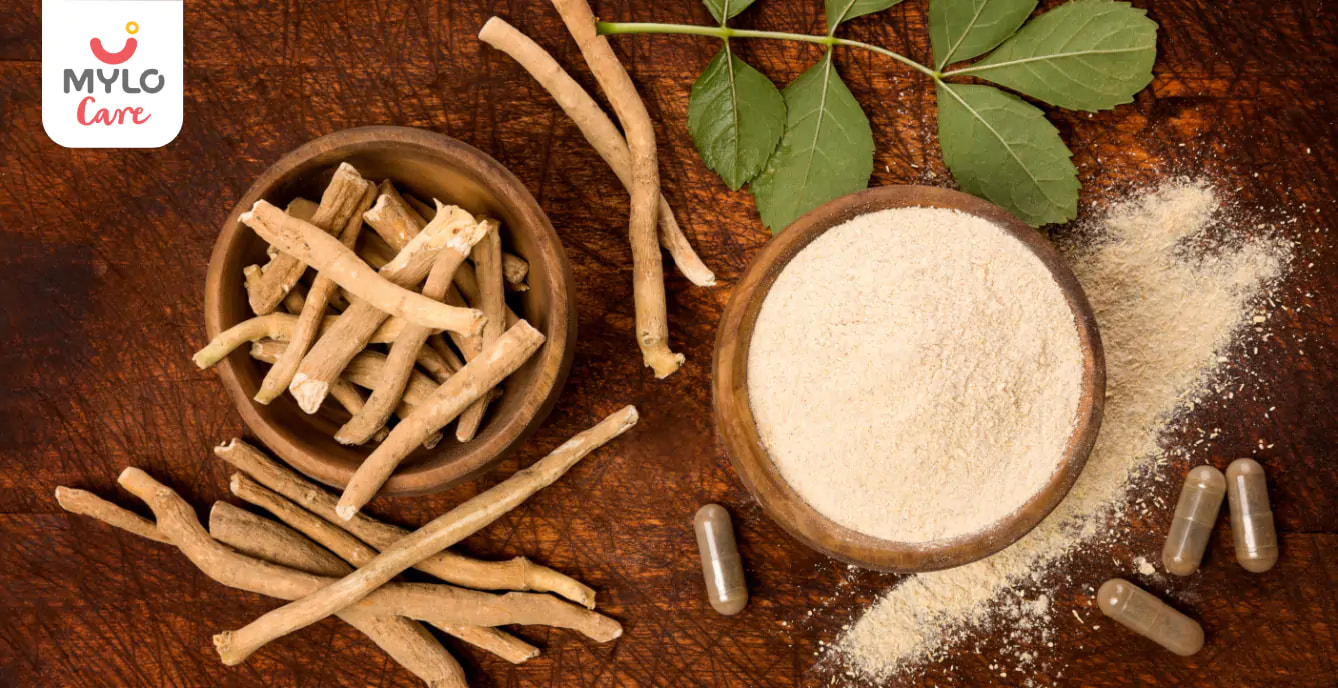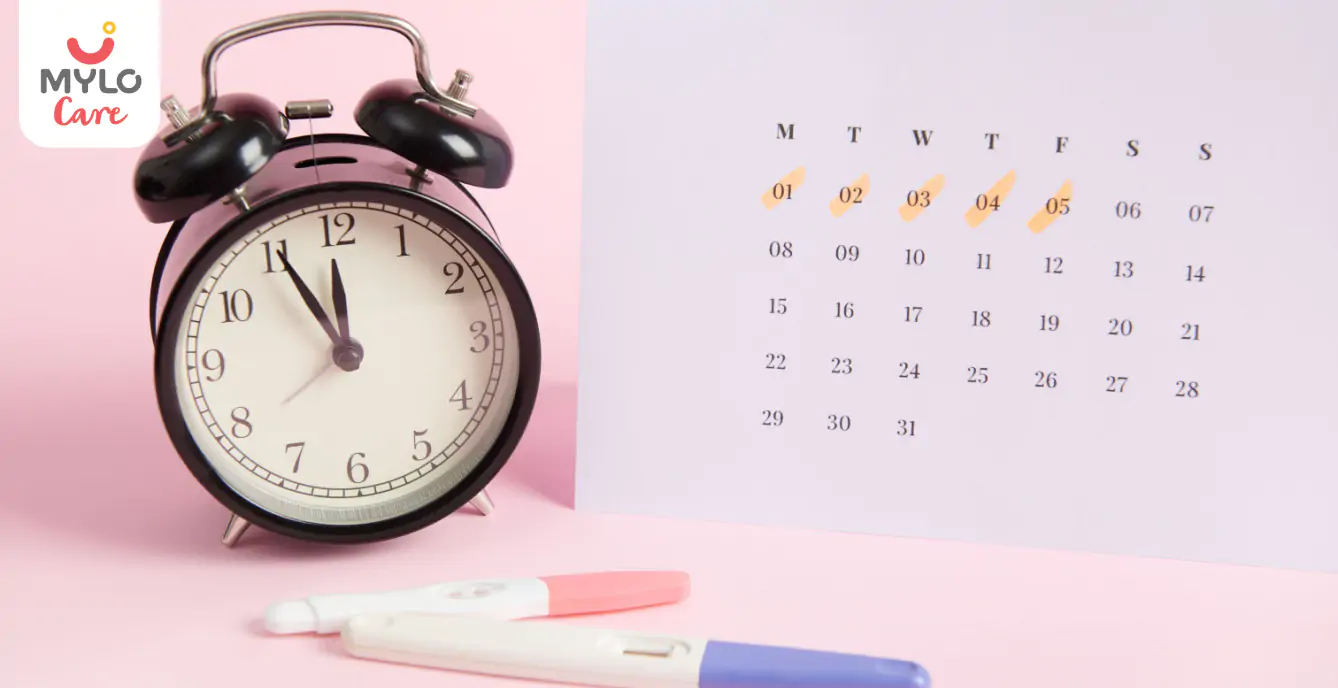Home

Conception

Ashwagandha Benefits for Female & Male Fertility: How This Ancient Herb Can Help You Conceive
In this Article

Conception
Ashwagandha Benefits for Female & Male Fertility: How This Ancient Herb Can Help You Conceive
Updated on 26 February 2024
Ashwagandha, also called the Indian ginseng, is a popular herb in Ayurveda. It has been used for centuries to improve overall health and treat various ailments. Recently, Ashwagandha has gained popularity for its ability to boost fertility in both men and women. In this article, we will explore the Ashwagandha benefits for female and male fertility and how it works.
What is Ashwagandha?
Ashwagandha is an Ayurvedic herb native to India, the Middle East, and parts of Africa. It is a small evergreen shrub that produces yellow flowers and red fruit. Its roots and leaves are used to make medicine. Ashwagandha is an adaptogen, which means it can help the body adapt to stress. It is also known for its anti-inflammatory, antioxidant, and immune-boosting properties.
How Can Ashwagandha Help With Fertility Issues?
Ashwagandha has been shown to boost fertility in both men and women. Ashwagandha benefits for men include an increase in sperm count, motility, and quality. In women, it can regulate menstrual cycles, improve ovarian function, and increase the chances of conception. Ashwagandha can also reduce stress and anxiety, which can have a positive impact on fertility.
What are Ashwagandha Benefits for Female Fertility?
When it comes to Ashwagandha benefits for women, it works by regulating hormone levels and reducing inflammation. It can regulate the menstrual cycle by balancing hormones. It can also reduce inflammation in the reproductive organs, which can improve fertility.
1. Ashwagandha for PCOS
Polycystic ovary syndrome (PCOS) is a common hormonal disorder that affects women in their reproductive age. It can cause irregular menstrual cycles, infertility, and other health problems. Ashwagandha has been shown to improve fertility in women with PCOS by regulating hormone levels and reducing inflammation. It can also improve insulin sensitivity, which can help to manage symptoms of PCOS.
2. Ashwagandha for Hormonal Imbalance
Hormonal imbalance is one of the leading causes of fertility issues in women. It can cause menstrual irregularities and difficulties with ovulation or implantation, resulting in challenges with becoming pregnant. Ashwagandha, being an adaptogenic herb, can help regulate hormonal balance, reduce stress and support healthy reproductive systems.
3. Ashwagandha for Menopause Symptoms
Ashwagandha is an adaptogenic herb that can help manage menopausal symptoms. It works by reducing stress and anxiety, which can be common during menopause. Ashwagandha is also known to regulate hormone levels, which can help alleviate hot flashes, mood swings, and other symptoms. Overall, Ashwagandha can be a natural way to manage menopausal symptoms and improve overall quality of life.
4. Ashwagandha for Stress and Anxiety
Ashwagandha works as an adaptogen, meaning it helps the body cope with stress. It has been investigated in several human trials and has been found to improve cognitive function, memory, and brain function, while reducing stress and anxiety symptoms. It can also help alleviate symptoms of mental health conditions such as depression and post-traumatic stress disorder (PTSD).
What are Ashwagandha Benefits for Men & Their Fertility?
Ashwagandha has been shown to boost fertility in both men and women. In men, it can increase testosterone levels, which can improve sperm count and motility. It can also reduce oxidative stress, which can damage sperm cells.
1. Ashwagandha for premature ejaculation
Premature ejaculation is a common problem that affects the sexual health of many men. It can cause distress and affect relationships. Ashwagandha has been shown to improve sexual function in men by reducing stress and anxiety. It can also increase testosterone levels, which can improve sexual performance.
2. Ashwagandha for sperm count
Low sperm count is a common cause of male infertility. Ashwagandha has been shown to increase sperm count, motility, and quality in men. It can also reduce oxidative stress, which can damage sperm cells. Ashwagandha can be a safe and effective treatment for male infertility.
3. Ashwagandha for Testosterone
Ashwagandha has been found to potentially support testosterone levels in men. It may do this by increasing testosterone production, levels of luteinizing hormone (LH), and even improving semen quality in men with infertility. Ashwagandha is an adaptogenic plant that helps the body cope with stressors, which may also indirectly boost testosterone levels by reducing cortisol levels.
4. Ashwagandha for Sexual Drive
Ashwagandha benefits for men also include its ability to enhance sexual desire. It is known to have aphrodisiac-like qualities and is an adaptogen that can help the body adapt to and manage stress, which is a common cause of low sex drive. As a result, it can be effective for treating low libido.
Other benefits of Ashwagandha for overall health
Besides Ashwagandha benefits for women and men's fertility, it has many other health benefits. It can reduce stress and anxiety, improve brain function, and boost the immune system. It can also reduce inflammation, lower cholesterol levels, and improve heart health. Ashwagandha is a powerful herb that can improve overall health and well-being.
Ashwagandha dosage and how to take it
Ashwagandha is available in various forms, including capsules, powders, and teas. The recommended dosage of Ashwagandha varies depending on the form and the condition being treated. It is important to follow the instructions on the label or to consult a healthcare professional before taking Ashwagandha. Generally, a dose of 250-500mg per day is recommended for general health and well-being.
Precautions and side effects of Ashwagandha
Ashwagandha is usually safe for most people as long as it is taken in recommended doses. However, it may cause side effects such as upset stomach, diarrhea, and vomiting. It may also interact with certain medications, such as sedatives and thyroid hormone replacement therapy. It is important to consult a healthcare professional before taking Ashwagandha, especially if you have a medical condition or are taking medication.
Conclusion
Ashwagandha is a powerful herb that has been used for centuries to improve overall health and treat various ailments. It has gained popularity in recent years due to Ashwagandha benefits for female and fertility. It can improve sperm count, motility, and quality in men, and regulate menstrual cycles and improve ovarian function in women.
References
1. Agarwal A, Allan JJ. (2010) Antifertility effects of herbs: Need for responsible reporting.
2. Akbaribazm M, Goodarzi N, Rahimi M. (2021). Female infertility and herbal medicine: An overview of the new findings.
3. Nasimi Doost Azgomi R, Zomorrodi A, Nazemyieh H, Fazljou SMB, et al. (2018). Effects of Withania somnifera on Reproductive System: A Systematic Review of the Available Evidence.
Tags
Ashwagandha Benefits for Female Fertility & Male Fertility in Hindi, Ashwagandha Benefits for Female Fertility & Male Fertility in Tamil, Ashwagandha Benefits for Female Fertility & Male Fertility in Telugu,



Written by
Anandita Sharma
Drawing on more than a decade of expertise in administration, Anandita Sharma currently serves as a content operations e
Read MoreGet baby's diet chart, and growth tips

Related Articles
Related Questions
Influenza and boostrix injection kisiko laga hai kya 8 month pregnancy me and q lagta hai ye plz reply me

Hai.... My last period was in feb 24. I tested in 40 th day morning 3:30 .. That is faint line .. I conculed mylo thz app also.... And I asked tha dr wait for 3 to 5 days ... Im also waiting ... Then I test today 4:15 test is sooooo faint ... And I feel in ma body no pregnancy symptoms. What can I do .

Baby kicks KB Marta hai Plz tell mi

PCOD kya hota hai

How to detect pcos

RECENTLY PUBLISHED ARTICLES
our most recent articles

Swaddling
What are the 12 things that parents can do with their baby in the first 12 months?

Medications
The Lowdown on Cetirizine in Pregnancy: A Must-Read for Expecting Moms

Play Activities
The Ultimate Collection of Paheliyan with Answer for Kids

Abdominal Pain
The Ultimate Guide to Abdominal Pain After Abortion Causes and Care

Ovulation Prediction Kits
Ovulation Kit 101: A Beginner's Guide to Tracking Fertility & Maximizing Your Chances of Conception

Abortion
Is Breast Pain after Abortion Normal? What You Need to Know
- Twin Pregnancy: Signs, Types & Risks
- Chasteberry Benefits: The Natural Remedy You Need for Infertility, Hormonal Imbalance, and PMS
- The Ultimate Guide to Planning the Perfect Baby Shower
- 50+ New Born Baby Wishes to Congratulate New Parents
- First Period After C Section: How Long Does It Last
- Introducing Solid Foods to your 6-month-old Baby? Here is a complete Food Chart along with some Nutritious Recipes
- What to expect about the height/length of 6 months old?
- The Development of Your Kid at the Age of Four Months
- Burping Your Baby
- What Is the Significance of Motor Skills in Children & How to Develop Them?
- The Ultimate Guide to Formula Milk: Everything You Need to Know
- Are baby monitors safe or dangerous for your little ones? How to protect your baby from EMF Radiations?
- Here’s a List of a Lot of Things That You Need to Know When Your Baby Starts Rolling Over
- How to Travel Around the World Stress-Free With Your Baby?


AWARDS AND RECOGNITION

Mylo wins Forbes D2C Disruptor award

Mylo wins The Economic Times Promising Brands 2022
AS SEEN IN

- Mylo Care: Effective and science-backed personal care and wellness solutions for a joyful you.
- Mylo Baby: Science-backed, gentle and effective personal care & hygiene range for your little one.
- Mylo Community: Trusted and empathetic community of 10mn+ parents and experts.
Product Categories
baby carrier | baby soap | baby wipes | stretch marks cream | baby cream | baby shampoo | baby massage oil | baby hair oil | stretch marks oil | baby body wash | baby powder | baby lotion | diaper rash cream | newborn diapers | teether | baby kajal | baby diapers | cloth diapers |




